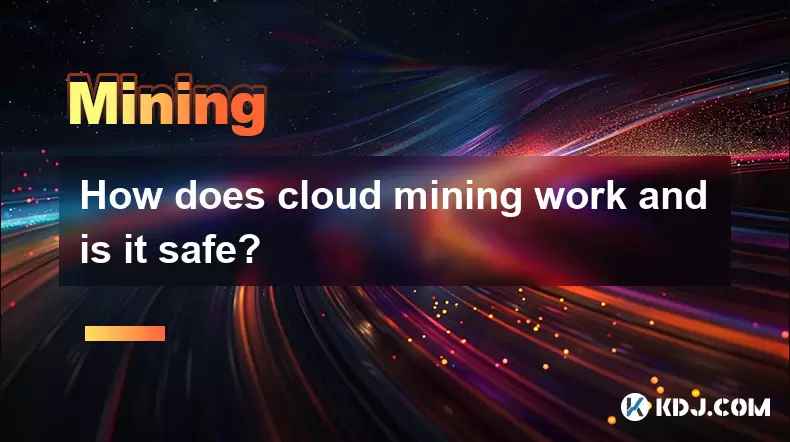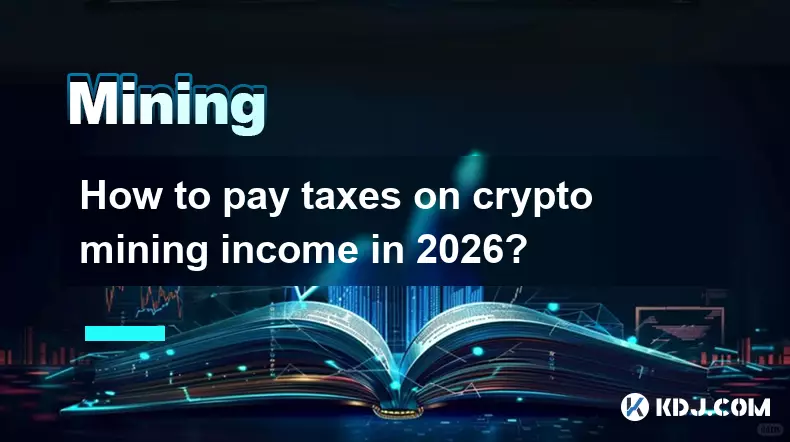-
 bitcoin
bitcoin $87959.907984 USD
1.34% -
 ethereum
ethereum $2920.497338 USD
3.04% -
 tether
tether $0.999775 USD
0.00% -
 xrp
xrp $2.237324 USD
8.12% -
 bnb
bnb $860.243768 USD
0.90% -
 solana
solana $138.089498 USD
5.43% -
 usd-coin
usd-coin $0.999807 USD
0.01% -
 tron
tron $0.272801 USD
-1.53% -
 dogecoin
dogecoin $0.150904 USD
2.96% -
 cardano
cardano $0.421635 USD
1.97% -
 hyperliquid
hyperliquid $32.152445 USD
2.23% -
 bitcoin-cash
bitcoin-cash $533.301069 USD
-1.94% -
 chainlink
chainlink $12.953417 USD
2.68% -
 unus-sed-leo
unus-sed-leo $9.535951 USD
0.73% -
 zcash
zcash $521.483386 USD
-2.87%
How does cloud mining work and is it safe?
Cloud mining lets users mine cryptocurrencies like Bitcoin by renting remote hashing power, avoiding the need for expensive hardware or technical expertise.
Jul 18, 2025 at 01:00 am

What Is Cloud Mining?
Cloud mining refers to the process of mining cryptocurrencies such as Bitcoin, Ethereum, or Litecoin through remote data centers that offer shared processing power. Instead of purchasing and maintaining expensive hardware like ASIC miners or GPUs, users can rent computing power from cloud mining providers.
This service allows individuals to participate in cryptocurrency mining without the need for technical expertise, physical space, or high electricity costs. Providers operate large-scale mining farms and offer contracts where users pay a fee to lease a certain amount of hashing power for a specific period.
Key Concept: Hash rate is the measure of computational power used in mining. Higher hash rates increase the probability of successfully mining a block and earning rewards.
How Does Cloud Mining Work?
The operational mechanism behind cloud mining involves three main components: the user, the provider, and the blockchain network. Here’s how it works:
- Users sign up on a cloud mining platform.
- They select a mining plan based on hash rate, duration, and cost.
- After payment, the provider allocates the purchased hashing power to mine cryptocurrencies.
- The mined coins are either automatically transferred to the user's wallet or held in the platform account.
- Some platforms allow users to reinvest earnings into additional hashing power.
Important Note: Cloud mining contracts often come with maintenance fees, which are deducted from earnings. These fees cover electricity, cooling, and upkeep of mining equipment.
Types of Cloud Mining Contracts
There are three primary types of cloud mining services available:
- Fixed Contracts: Users get a fixed amount of hashing power for a set time period, regardless of price fluctuations or difficulty changes.
- Flexible Contracts: Hashing power adjusts according to network difficulty and market conditions. This model usually offers better returns but comes with higher risk.
- Lease Contracts: These are short-term agreements allowing users to mine for a limited time, often used during bull markets when profitability is expected to be high.
Critical Insight: Contract terms should be reviewed carefully before purchase. Always check for hidden fees, payout schedules, and withdrawal policies.
Is Cloud Mining Profitable?
Profitability depends on several factors including:
- Cryptocurrency price volatility
- Network difficulty
- Hash rate performance
- Platform fees
- Contract duration
Users can use online calculators to estimate potential returns by inputting variables such as hash rate, energy cost, and current coin prices.
Example: If you buy a 10 TH/s Bitcoin mining contract at $50 per month, and Bitcoin’s price rises while network difficulty remains stable, your monthly return could exceed the cost, making it profitable.
However, if the price drops significantly or difficulty increases sharply, earnings may not cover expenses.
Is Cloud Mining Safe?
Safety in cloud mining varies widely depending on the platform chosen. While some legitimate providers exist, many fraudulent schemes have emerged over the years.
Red flags include:
- Unrealistic profit promises (e.g., doubling investment within days)
- Lack of transparency about mining farm locations or infrastructure
- Absence of verifiable user reviews or third-party audits
- Platforms that pressure users to refer others for bonus earnings
Security Tip: Always verify if the platform has a valid SSL certificate, responsive customer support, and clear documentation regarding payouts and withdrawals.
Reputable platforms typically publish real-time mining stats and offer transparent dashboards.
How to Choose a Reliable Cloud Mining Provider
To ensure safety and maximize returns, follow these steps:
- Research the company’s history and reputation
- Check forums like Reddit, Bitcointalk, and Trustpilot for feedback
- Confirm if they provide proof of mining operations
- Evaluate their payout structure and minimum withdrawal limits
- Ensure they offer two-factor authentication (2FA) for account security
Best Practice: Start with a small investment to test the platform before committing large sums of money.
Also, avoid platforms that require mandatory reinvestment or restrict withdrawals until certain thresholds are met.
Frequently Asked Questions
Q1: Can I mine multiple cryptocurrencies using cloud mining?Yes, many platforms offer multi-currency mining options. You can mine Bitcoin, Ethereum, Litecoin, and even altcoins depending on the provider’s supported algorithms.
Q2: Are cloud mining profits taxable?In most jurisdictions, cryptocurrency earnings are subject to capital gains tax. Always consult a local tax advisor to understand your obligations.
Q3: What happens if a cloud mining company shuts down?If a provider closes operations, users may lose access to their hashing power and future earnings. It’s crucial to choose companies with long-term stability and exit strategies.
Q4: Do I need a wallet for cloud mining payouts?Yes, you must link a compatible wallet to receive mined coins. Most platforms support wallets like Trust Wallet, MetaMask, or hardware wallets for added security.
Disclaimer:info@kdj.com
The information provided is not trading advice. kdj.com does not assume any responsibility for any investments made based on the information provided in this article. Cryptocurrencies are highly volatile and it is highly recommended that you invest with caution after thorough research!
If you believe that the content used on this website infringes your copyright, please contact us immediately (info@kdj.com) and we will delete it promptly.
- Wintermute CEO Dismisses Crypto Collapse Rumors Amidst Market Volatility
- 2026-02-09 01:45:01
- Trump's Crypto Tango: White House Talks Ignite BTC & PKR Markets
- 2026-02-09 01:40:01
- Ethereum's Volatility: Navigating Longs Amidst WAGMI Hopes and Technical Upgrades
- 2026-02-09 01:35:02
- Web3, RWA, and the Regulatory Reckoning: Charting a Course for Compliant Innovation
- 2026-02-09 01:30:01
- Super Bowl Coin Toss: Decoding the Flip, Betting Tips, and a Historic Twist for the Big Game
- 2026-02-09 01:25:01
- Heads Up, New York! Super Bowl 2026 Coin Toss, Free Bets, and the Unpredictable Flip of Fate
- 2026-02-09 01:20:02
Related knowledge

How to mine crypto sustainably in 2026?
Feb 07,2026 at 04:20pm
Energy Source Optimization1. Miners increasingly deploy solar arrays directly on warehouse rooftops to power ASIC rigs during daylight hours. 2. Geoth...

How to mine Conflux on a standard gaming laptop?
Feb 07,2026 at 04:19am
Hardware Requirements for Conflux Mining1. Conflux uses a proof-of-work consensus mechanism called Tree-Graph, which is designed to be ASIC-resistant ...

How to buy hashing power on cloud mining platforms?
Feb 08,2026 at 05:59pm
Understanding Cloud Mining Contracts1. Cloud mining platforms offer users the ability to rent hashing power without owning or maintaining physical har...

How to mine Flux with a 30-series Nvidia GPU?
Feb 07,2026 at 02:40pm
Market Volatility Patterns1. Bitcoin price movements often exhibit sharp intraday swings exceeding 5% during low-liquidity windows, particularly betwe...

How to pay taxes on crypto mining income in 2026?
Feb 07,2026 at 01:20am
Tax Classification of Mining Rewards1. Cryptocurrency received as mining rewards is treated as ordinary income by most major tax jurisdictions includi...

How to find the lowest fee mining pools for BTC?
Feb 07,2026 at 01:00pm
Fee Structure Transparency1. Most reputable BTC mining pools publish their fee schedules directly on their official websites, often under sections lab...

How to mine crypto sustainably in 2026?
Feb 07,2026 at 04:20pm
Energy Source Optimization1. Miners increasingly deploy solar arrays directly on warehouse rooftops to power ASIC rigs during daylight hours. 2. Geoth...

How to mine Conflux on a standard gaming laptop?
Feb 07,2026 at 04:19am
Hardware Requirements for Conflux Mining1. Conflux uses a proof-of-work consensus mechanism called Tree-Graph, which is designed to be ASIC-resistant ...

How to buy hashing power on cloud mining platforms?
Feb 08,2026 at 05:59pm
Understanding Cloud Mining Contracts1. Cloud mining platforms offer users the ability to rent hashing power without owning or maintaining physical har...

How to mine Flux with a 30-series Nvidia GPU?
Feb 07,2026 at 02:40pm
Market Volatility Patterns1. Bitcoin price movements often exhibit sharp intraday swings exceeding 5% during low-liquidity windows, particularly betwe...

How to pay taxes on crypto mining income in 2026?
Feb 07,2026 at 01:20am
Tax Classification of Mining Rewards1. Cryptocurrency received as mining rewards is treated as ordinary income by most major tax jurisdictions includi...

How to find the lowest fee mining pools for BTC?
Feb 07,2026 at 01:00pm
Fee Structure Transparency1. Most reputable BTC mining pools publish their fee schedules directly on their official websites, often under sections lab...
See all articles





















![Is This a REAL Reversal or Fake out?? I wouldn't Get Excited Just Yet... [20 Min emergency stream] Is This a REAL Reversal or Fake out?? I wouldn't Get Excited Just Yet... [20 Min emergency stream]](/uploads/2026/02/08/cryptocurrencies-news/videos/origin_698897450a654_image_500_375.webp)


![Mesocosmos (By Biskotos) [All Coins] | Geometry Dash Mesocosmos (By Biskotos) [All Coins] | Geometry Dash](/uploads/2026/02/08/cryptocurrencies-news/videos/origin_69889be2eac64_image_500_375.webp)

















































